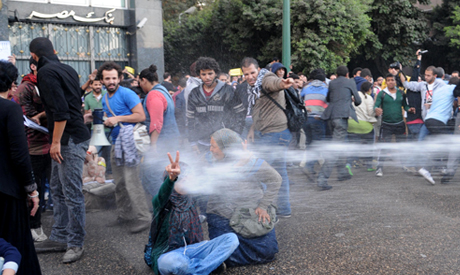
Egyptian police fire water cannons to disperse a protest by secular anti-government activists in Cairo, Tuesday, Nov. 26, 2013 (Photo: AP)
It has been a big year of many changes in Egypt. But it seems as though one thing will always stay the same: corruption.
That's the focus of a study published on Tuesday by Transparency International, an organization which measures global corruption. Based on its Corruption Perception Index, countries are given a score from 0 to 100, with 0 being the most corrupt.
On how it measures corruption, Transparency International says on its website that the "perceptions of country analysts, business people or the general public" form the basis of its corruption indices.
Both this year and last, Egypt scored a 32, placing it 114 out of 177 countries.
Most of the reasons for this year's low score were attributed to the ruling period of ousted president Mohamed Morsi. The report viewed the 30 June protests against Morsi's rule as evidence that the government had not taken enough steps, or any, towards battling corruption and cronyism.
Ongoing street violence is generally seen as a hallmark of state and non-state actions against civil society.
Another reason for the low rating was Morsi's crackdowns on NGOs, the report said.
Last May, Morsi passed a controversial law giving the government and security forces the right to control NGOs and restrict their access to foreign funds. Human Rights Watch and other prominent organizations condemned the involvement in the affairs of civic groups.
This law was amended following Morsi's ouster, but the new draft has not yet been approved by the interim government.
Corruption in the government extends far beyond a single controversial law, though. Embezzlement and trade mispricing are ripe, often the main drivers of illicit financial outflows.
In a 2011 study by the Global Financial Integrity Organisation, Egypt was ranked 25 globally in terms of illicit financial outflow.
From 2000 to 2008, $57.2 billion was taken out of Egypt through illegal means, according to the study. About 60 percent of the total figure, $3.8 billion annually, was due to corruption and crime. Trade mispricing accounted for an annual illicit outflow of $2.54 billion.
The Transparency International study suggested that in order to battle corruption, the government must partner with civil society.
Last month, interim President Adly Mansour issued a law banning any activity which presents a conflict of interest for government officials.
The new law regulates, among other things, the possession of assets.
Short link: